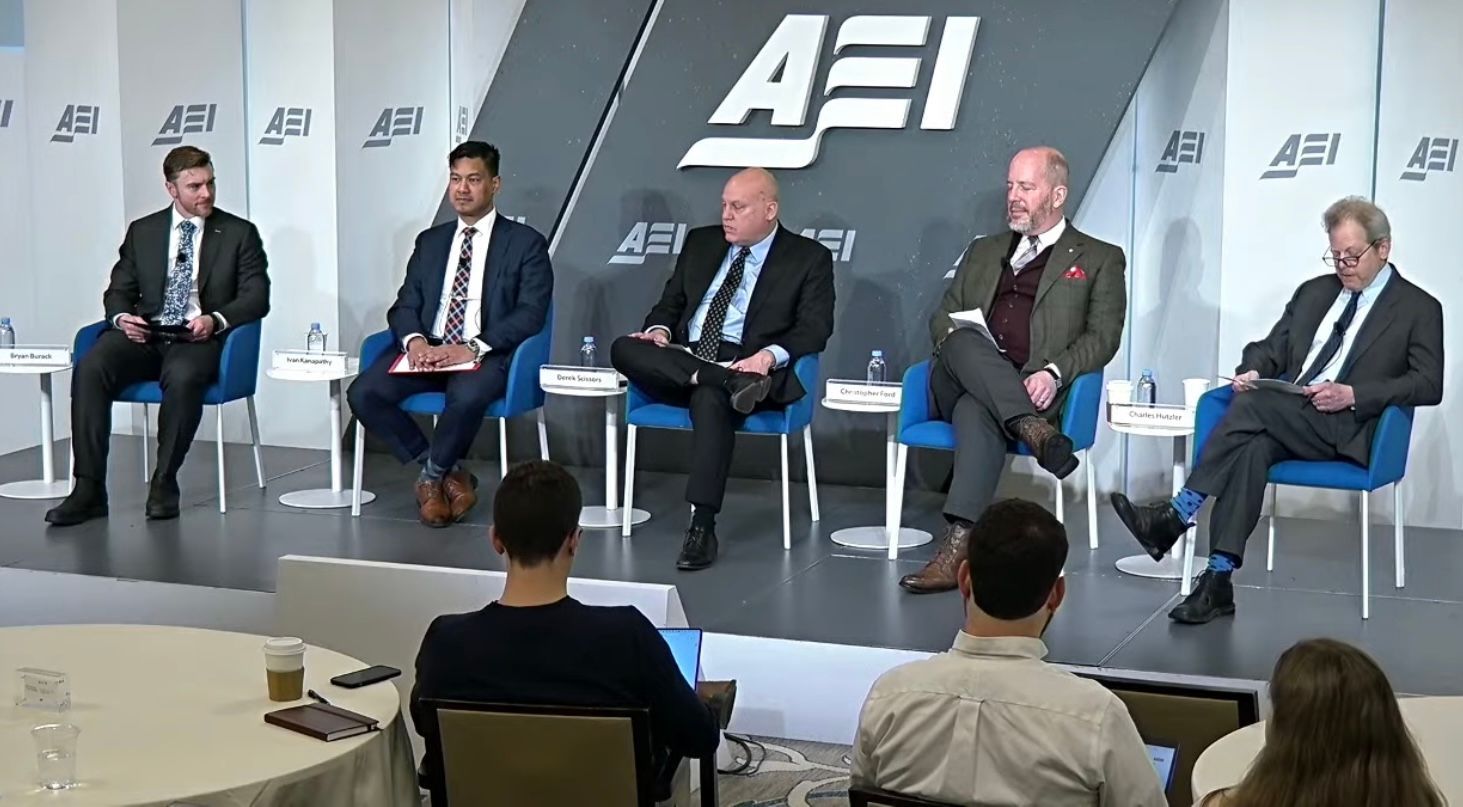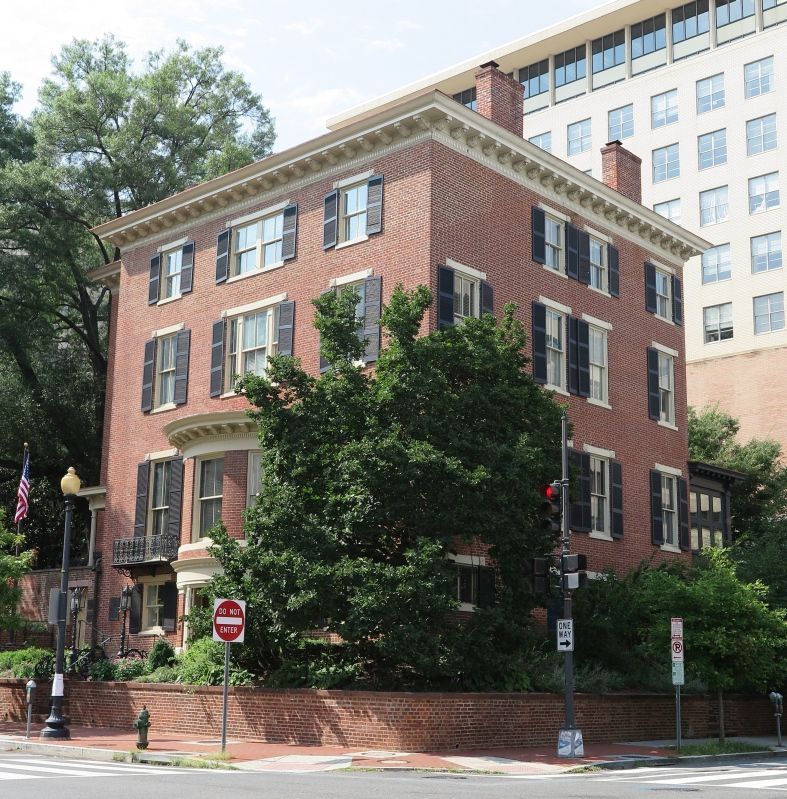The Hon. Christopher A. Ford
New Paradigms Forum -- International Security Policy Since 2009
Sino-American Relations and the Challenge of “Military-Civil Fusion”
Below appear the remarks Assistant Secretary Ford delivered at the U.S. Department of State's Foreign Service Institute on February 20, 2020.
Good day, everyone. It’s a pleasure to be able to speak to you as part of your program on “Thinking Globally” here at the Foreign Service Institute (FSI). David asked me if I would say a few words about strategic culture — especially vis-à-vis our challenging relationship with China — and I’m happy to do so.
The idea of “strategic culture” is, in effect, a modernized, more sophisticated, and more nuanced way of approaching what sometimes used to be described many years ago as the study of national “types.” Much of what was thought and said under that older rubric, I’d imagine, was essentialist hokum. But there’s been a fair amount of much more subtle, interesting, and useful scholarship in the last couple of generations that looks at the subject of strategic culture as a useful way to help understand and navigate difference in the international arena.
A Powerful Influence (at least on me)
Since I am more diplomat than scholar at the moment, and since time is short, I won’t try to summarize all that literature for you, even if I could. But even without me consciously intending it, broad themes related to the ways in which cognitive frameworks and historically rooted conceptual and ideological baggage influence foreign relations and national security decisions have wound through my own work for many years.
My doctoral dissertation, for instance, focused heavily upon the ways in which ancien regime South Africa’s odious apartheid ideology — and that theory’s evolution over the last 30 years or so before its well-deserved collapse — helped condition and shape how white South African leaders interpreted and reacted to their strategic environment and approached regional relations. My first book, on the history of U.S. Navy operational intelligence , had a chapter on evolving American understandings of what one could describe as the “culture” of Soviet naval war planning and how this helped drive a revolution in our own posture, leading up to the pivotal “Maritime Strategy” implemented in the early 1980s in anticipation of World War III at sea.
In two subsequent books, I tried in various ways to use the prism of what might generally be called strategic culture to understand the People’s Republic of China and its approach to Sino-American relations , to help inform U.S. and other Western approaches to dealing with it. This work has helped inform how I — and perhaps we — have understood and developed responses to the modern-day challenges of competitive strategy vis-à-vis Beijing, as called for in the National Security Strategy that was published when I served on the National Security Council staff at the White House in 2017.
I would urge you, as new diplomats, to cultivate an interest in strategic culture and a taste for trying to understand it — particularly, of course, the strategic culture of the countries where you will serve, and with which you will deal, during your career. In my experience, such approaches can be valuable, even indispensable, in diplomacy, geopolitics, and grand strategy. I am here today to encourage such interest!
Some Notes of Caution
But since there is a risk of slipping into essentialist reductionism and determinism when talking about strategic culture, let me also admonish you: be careful. Like any powerful tool, “strategic culture” thinking can be abused, either inadvertently or willfully.
It’s important not to reify “culture” in ways that overdetermine analyses and outcomes. I do think understanding strategic culture — broadly construed to include the substantive content, background assumptions, and fetishes of political ideology — can be extremely important in seeing patterns and tendencies, and in explaining what at first glance may seem anomalous or incoherent. But its influence on attitudes and behavior is in no way rigidly mechanistic.
Human societies don’t work in that kind of deterministic way; they are essentially always complicated and internally variegated, and resistant to reductionist analyses, and even the most autarkic and totalitarian of societies cannot be wholly cut off from exogenous and potentially disruptive influences. To use the language of complexity theory, if one thinks of national societies and their strategic cultures as complex adaptive systems , it would follow that while there will tend to be powerful conceptual and behavioral continuities over time — that is, the persisting patterns that make the study of strategic culture interesting and rewarding — it is also always possible that the system will respond to the next perturbation by suddenly reorienting itself around a new “attractor” in an unpredictable way.
So it would be a big mistake for you to see strategic culture as a deterministic framework in which the participants lack agency, and in which there is no randomness or “noise” in the system, no internal contestation (or perhaps confusion) over approaches and outcomes, and no scope for sometimes considerable variation. In an additional complication, it is also likely that not all polities with which you will deal in your career as diplomats actually have a clear and behaviorally relevant strategic culture — or at least one distinctive enough, or different enough from whatever our own strategic culture is, to make studying their strategic culture particularly rewarding. (The distinctiveness and subjective “strength” of any strategic culture on those who are part of it presumably varies, perhaps considerably.)
All of this complexity and variability makes it unwise to take strategic culture as an explanatory or predictive construct with which one can easily “decode” one’s interlocutors and which can provide a clear roadmap to dealing with them. So be careful of simplistic assumptions, be intellectually humble, and remain alive to the challenges of all this complexity; if you don’t, you risk replicating the sins of our forefathers’ essentialisms.
None of this means you cannot learn a lot from studying strategic culture. It’s surely also the case that trying to understand whatever background of strategic culture your counterparts may bring to the table is surely a far better starting point than just doing what so many people tend to do by reflex — namely, “mirror imaging” the foreign Other by assuming him to have the same background assumptions, desires, aversions, and role ascriptions that we do. Maybe he actually does, more or less, but more often the conceptual baggage your counterparts bring to the relationship will differ from yours, and potentially quite a bit. For a diplomat to miss such difference can be a dangerous failure, and it is part of your job not just to understand such difference, but also to convey your understanding of it to those of us back here in Washington policymaking circles, so that we can plan our own approaches informed by your insights.
A Case Study: the People’s Republic of China
In my own work on China, I have loosely followed the notion of strategic culture suggested by Alastair Ian Johnston , who has argued that states have different “predominant sets of strategic preferences that are rooted in the ‘early’ or ‘formative’ … experiences of the state or its predecessor, and are influenced to some degree by the philosophical, political, cultural, and cognitive characteristics of the state and state elites as those develop through time.” I think there is great value in looking at such factors, and in trying to understand how they may shape present-day approaches. After all, as I have observed ,
“[t]heories of decision making dynamics have long identified ways in which decisionmakers — especially in times of crisis but by no means only then — commonly resort to rules of thumb and stock assumptions about historical patterns and geopolitical causality in order to help them cope with the press of events. Such patterns may at times be influenced by highly personal and idiosyncratic factors, but information organizing is also a learned behavior, in which patterns are both projected backward on the past and passed forward through time by means of the education and socialization of individual human beings.
“ … [I]t seems safe to say that the sophisticated observer need not revert to archaic and culturally deterministic ideas of national types in order to appreciate that different countries and different peoples do have different experiences of the world and do understand their present at least partly through the prism of the past — or at least through what they take the past to have taught them. Culture is hardly destiny, and cultural baggage is seldom so heavy that its owners cannot carry it some distance down a road they themselves choose. Yet culture does matter, and, by understanding its ‘historically imposed inertia on choice,’ we can often make great strides toward understanding the motivational structure and behavior of specific groups, peoples, and national elites.”
You’re presumably wondering how such concepts have actually informed how I come at my work in the State Department, so let me offer you the example of some of the modern-day challenges we in the so-called “T family” bureaus face in dealing with Beijing’s global revisionism and its strategy of “Military-Civil Fusion ” (MCF). Attention to strategic culture has helped inform work in these areas with respect both to how we understand the People’s Republic of China (PRC) as a strategic competitor and how we are working to restructure aspects of our own strategic culture vis-à-vis the PRC.
I’ve spoken and written elsewhere about these issues, so I’ll summarize here. As I see it, the PRC’s modern geopolitics is profoundly shaped by China’s experience of basking in premodern imperial hubris as the self-conceived center of the world (hence the old phrase “Middle Kingdom”) followed by the shock of its encounter with Western power in the 19th Century — a psychic trauma that created what Beijing often refers to as a “century of humiliation” and that has become the leitmotif and central narrative of the Chinese Communist Party (CCP) regime in its attempt to bring about China’s return to geopolitical primacy.
In the broadest terms, the CCP has yoked its legitimacy to restoring the regional primacy that China imagines itself to have had, and to have deserved, for centuries. This is key to understanding the PRC’s contemporary revisionist assertiveness in the geopolitical arena, and especially its desire to supplant the United States within the Indo-Pacific region and restructure global order around itself — a desire which Beijing downplayed to others for many years as a tactical expedient, but which has resonated in nationalist thinking for generations. It could be seen in Chinese strategic writings and CCP propaganda tropes even during the ostensibly “pragmatic” years of Deng Xiaoping. Xi Jinping’s regime now wears geopolitical revisionism on its sleeve.
Attuned to such currents, one can also see that the CCP has even set itself a timetable for this achievement of “return”: the year 2049, the centennial of the PRC’s founding. By that point, the CCP hopes to be able to justify its authoritarian brutalities and secure its future by painting itself as having brought about a century of progress that restored the PRC to the top of the global heap. Such a centenary achievement would thus atone, with perfect symmetry, for the perceived national or civilizational grievance of China’s “century of humiliation,” memories of which continue to be carefully nursed by regime propagandists.
As a strategic culture buff, it seems to me that all of this is a fairly elegant way of accounting for a great deal of historical data, and in explaining both change and consistency in Chinese foreign policy, especially for the era of modern Chinese history following the death of Mao Zedong.
Such understandings of strategic culture can also help explain recurring patterns and predilections in PRC views both of itself and of the United States. China’s is a political culture infused with Confucian notions of monist political hierarchy, seeing humanity as inherently existing in concentric circles of power and status along a gradient of moral and civilizational virtue. In this context, it is hardly surprising that the PRC has struggled painfully with questions of self-image in the face of humiliating geopolitical adversity and during its subsequent labors to climb back up to the global status that its notion of civilizational self demands.
Not for nothing, for instance, can Jing Tsu write an entire book chronicling narratives of self-perceived civilizational failure and insecurity in late 19th-Century and early 20th-Century Chinese literature, and showing how such themes were central to the formation of China’s national self-identity. Not for nothing is the PRC’s contemporary foreign policy assertiveness so tinged with chip-on-the-shoulder sensitivity and volatile emotiveness about the apparently fragile and easily bruised “feelings of the Chinese people.” And not for nothing, indeed, as can be seen in Gilbert Rozman’s work on East Asian national identities , does China’s historical love-hate relationship with the United States — the superpower against which all geopolitical status must be measured — feature to the point of obsession in the politics of the CCP’s self-image. The study of strategic culture helps us glimpse the non-separateness of such dynamics, and the ways in which longstanding themes resonate in the PRC.
Military-Civil Fusion
More practically, I would submit that an understanding of Chinese strategic culture can also help the observer better understand some of the specific PRC policies that present challenges for U.S. foreign policy today, among them the PRC’s strategy of “Military-Civil Fusion” — Beijing’s command-directed, whole-of-system effort to harness the potential of emerging sensitive technologies to develop the world’s most advanced military. This includes, to put it crudely, the PRC stealing our technology to build its military. But there is nothing crude about the effort: it is systematic, well-funded, ruthlessly applied, and informed by strategic vision.
MCF is an outgrowth, as it were, of the PRC’s geopolitical revisionism: a core element of the CCP’s effort to bring about China’s “return” to primacy. MCF is grounded in China’s 19th Century experience of being bested by Westerners who were felt to be uncouth barbarians, but who had the benefit of more advanced technology. This historical memory is magnified by Beijing’s encounter with the information technology-driven “revolution in military affairs” (RMA) that made the U.S. military surpassingly supreme in the early 21st Century.
The CCP has powerfully internalized the idea that “first movers” in the RMA that defines each military epoch are rewarded by geopolitical dominance, and — with China feeling left behind by prior RMAs, with its status and global power suffering accordingly — Beijing is desperately focused on ensuring that it wins such advantage for itself in the next RMA. The regime also fears that China’s failing to win pole position in the next RMA could spell the Party’s doom by precluding the global “return” upon which it has staked its political legitimacy.
The strategic cultural imperative of “return” is the conceptual engine for MCF. In effect, therefore, the peculiarities of Chinese strategic culture have helped set the stage for current PRC efforts to target key Western technology sectors — among them artificial intelligence, quantum applications, machine learning, aviation engines, “Big Data,” and nuclear power generation — for both lawful acquisition and outright theft, and for the systematic diversion of such technologies to military applications. These MCF efforts, in turn, are a key focus of our own present-day policy.
In sum, strategic culture is important in how we came to face today’s foreign policy and national security problems. But strategic culture is also an important part of how we need to respond, in the sense that we need to work with and within our own strategic culture to develop and implement effective answers in the face of these challenges.
And our own strategic culture is an important piece of the puzzle. For some time after the end of the Cold War, the U.S. policy community largely stopped thinking strategically, apparently assuming that now that the Soviet Empire had collapsed, our strategic environment would be one in which we no longer had to worry about the ugly and challenging game of great power competition. Perhaps it’s not quite fair to call the resulting mindset one of complacency, because our foreign policy establishment showed energy and focus in addressing other challenges such as fighting ethnic cleansing, pursuing nation-building in the developing world, fighting terrorism, and preventing the spread of weapons of mass destruction. In a strategic sense, however, we fell asleep, even while the PRC and Russia — alarmed by our post-Cold War global dominance and determined to relitigate their own diminished status and geopolitical power — put their proverbial noses to the grindstone while we weren’t paying attention.
Now that we have started paying attention to great power competition again, and indeed have enshrined it as perhaps the central objective of our National Security Strategy and National Defense Strategy , it is part of our job to deliberately reshape United States strategic culture to build into our practices and habits of mind the competitive mentality that our adversaries have by now long since institutionalized, and that we ourselves now need to relearn. With regard to the challenges that MCF presents, for instance, we need to reshape our own narratives of engagement with the PRC in ways appropriate in light of the systematic technology acquisition and military diversion that is now clearly going on.
This narrative reformulation across the U.S. and broader Western policy community is especially important because MCF is a whole-of-system threat. Since our democratic, rights-based, rule-of-law system denies us the coercive tools that the CCP enjoys in China, we need to reform government practices and cultivate a broad societal appreciation of these challenges — and of the need for more careful habits of caution and prudence — in private industry, academia, the life sciences, Silicon Valley, and other high-technology research and development sectors. We need, in short, to build a new culture of caution and threat awareness across the board.
MCF is just one example of how themes of strategic culture refract through cutting-edge issues in U.S. foreign policy. I hope this illustration shows how studying strategic culture can help diplomats and policymakers understand the challenges they face and shape appropriate responses. Personally, I find it heady and exciting stuff. I hope that as you head out into the world as champions of American diplomacy , you will too.
Thank you.
-- Christopher Ford



Copyright Dr. Christopher Ford All Rights Reserved






